|
|
|
Sort Order |
|
|
|
Items / Page
|
|
|
|
|
|
|
| Srl | Item |
| 1 |
ID:
062182
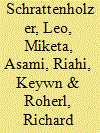

|
|
|
|
|
| Publication |
Cheltenham, Edward Elgar, 2004.
|
| Description |
x, 219p.
|
| Series |
ERSI studies series on the environment
|
| Standard Number |
1843769239
|
|
|
|
|
|
|
|
|
|
|
|
Copies: C:1/I:0,R:0,Q:0
Circulation
| Accession# | | | | | | | | | | | |
| 049668 | 333.79/SCH 049668 | Main | On Shelf | General | | | | | | | |
|
|
|
|
| 2 |
ID:
168670
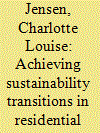

|
|
|
|
|
| Summary/Abstract |
Reducing greenhouse gas emissions in the residential sector is central to European energy policy. However, the speed and scale of sustainable energy transitions need to accelerate. There is a growing consensus that meeting energy targets is highly dependent on interrelated socio-material and cultural aspects of energy use. New ways of framing energy demand that go beyond dominant efficiency- and behavior models are needed. Recognizing these concerns, this paper reports on a review of 1067 Sustainable Energy Consumption Initiatives (SECIs) that aim to reduce residential energy use across 30 European countries. The initiatives are categorized and a corresponding Problem Framing Typology (PFT) is developed, highlighting important aspects of different types of problem framings. The typology contains four categories including 1) Changes in technology; 2) Changes in individual behavior; 3) Changes in everyday life situations; 4) and Changes in complex interactions. Applying the PFT to the 1067 SECIs shows that the vast majority (75%) of SECIs are positioned within category 1 and 2, indicating a lingering bias towards technocratic consumer behavioral strategies. The limitations of such approaches are discussed, and it is argued that systematically addressing interactions between technology, businesses, culture and everyday-life is more likely to lead to long-term transformation.
|
|
|
|
|
|
|
|
|
|
|
|
|
|
|
|
| 3 |
ID:
066678
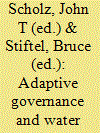

|
|
|
|
|
| Publication |
Washington, Resources for the future, 2005.
|
| Description |
xii, 274p.
|
| Standard Number |
193311519x
|
|
|
|
|
|
|
|
|
|
|
|
Copies: C:1/I:0,R:0,Q:0
Circulation
| Accession# | | | | | | | | | | | |
| 050369 | 333.7/SCH 050369 | Main | On Shelf | General | | | | | | | |
|
|
|
|
| 4 |
ID:
173226
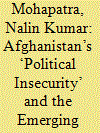

|
|
|
|
|
| Summary/Abstract |
The ‘sustainable peace’ is eluding Afghanistan over centuries. This can largely be attributed to both external geopolitical factors as well as the internal domestic realignments. Often these two factors operate in isolation and at times collude with each other, thus accentuating both domestic and regional instability. The fallout of protracted conflict in Afghanistan in the last few decades has resulted in the emergence of weak governance structure along with the proliferation of radicalism and the flow of narcotics to the neighbouring regions. Eurasia is one such region which has largely been affected by the developments in Afghanistan. The Eurasian states’ engagement with Afghanistan can be looked both through the prism of geopolitical developments that took place in the region following the collapse of the Soviet Union and post-9/11 developments which resulted in the intervention of external actors. The present geopolitical imbroglio is largely emanating from the decision of the United States to leave Afghanistan and the Russian’s desire to fill the vacuum. Iran and China are also engaged in shaping the geopolitical dynamics of this trouble-torn state. India, on the other hand, perceives security and stability of Afghanistan are important for greater regional economic cooperation which will facilitate its effective engagement in Eurasia.
|
|
|
|
|
|
|
|
|
|
|
|
|
|
|
|
| 5 |
ID:
107624
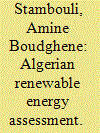

|
|
|
|
|
| Publication |
2011.
|
| Summary/Abstract |
Algeria plays a very important role in world energy markets, both as a significant hydrocarbon producer and as an exporter, as well as a key participant in the renewable energy market. Due to its geographical location, Algeria holds one of the highest solar potentials in the world. This paper presents a review of the present renewable energy situation and assesses present and future potential of renewable energy sources (RESs) in Algeria. This paper also discusses the trends and expectation in solar systems applications and the aspects of future implementation of renewable energies in the Middle East and North Africa (MENA) region status. The problem related to the use of RES and polices to enhance the use of these sources are also analysed in this paper. In addition the available capacity building, the technical know-how for each RES technology and localizing manufacturing of renewable energy equipments are defined. The co-importance of both policy and technology investments for the future Algerian markets of RES and competitiveness of the solar/wind approach is emphasized. Some examples of policy significantly impacting Algerian markets are reviewed, and the intention of the new Algerian RES initiative is discussed.
|
|
|
|
|
|
|
|
|
|
|
|
|
|
|
|
| 6 |
ID:
167004
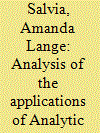

|
|
|
|
|
| Summary/Abstract |
In Brazil, the public lighting sector is a responsibility of the municipal government and typically represents around 4% of the electricity consumed by cities. Considering the significant importance and functions of this service, sustainable management is necessary. The aim of this paper is to investigate the main practices used worldwide in terms of energy efficiency of public lighting and propose the use of the multi-criteria method called Analytic Hierarchy Process to choose the best options for a group of Brazilian cities, namely Passo Fundo, Santa Maria and Porto Alegre. The methodology of this paper consists of searching for best practices in public lighting, which worked as alternatives for applying the Analytic Hierarchy Process. The final step consisted of presenting the impacts of a potential implementation, through analysis of energy and financial savings. The results suggest the preferred practices to each municipality (Audit and Guide Elaboration, Retrofit, Alternative Energy and Management) and their potential implementation can promote energy and financial savings up to 6 GWh/year and 600,000.00 US$/year. The main implications of this paper are related to proposing the use of a multi-criteria method to the public lighting sector and providing useful insights for local governments and especially for developing countries.
|
|
|
|
|
|
|
|
|
|
|
|
|
|
|
|
| 7 |
ID:
147999
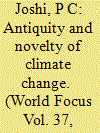

|
|
|
|
|
| Summary/Abstract |
Climate change discourse entails a very complex set of factors, policies, negotiations and diplomacy, at the same time it exemplifies a very peculiar practice of science as well. Multiple voices which are quite commonly known as the climate change negotiations have turned it into a very critical debate. The discourse is critical not because there is climate change, which after all is an eternal phenomenon responsible right from Jurassic upheavals to the pre-Holocene glaciations. It is because, this time around, there is clear cut and quite visible anthropogenic contribution to acceleration of adverse effects of climate change resulting in the warming of the earth having far reaching consequences.
|
|
|
|
|
|
|
|
|
|
|
|
|
|
|
|
| 8 |
ID:
193588
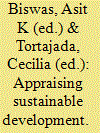

|
|
|
|
|
| Publication |
New Delhi, Oxford University Press, 2005.
|
| Description |
xviii, 223p.: table, figurespbk
|
| Standard Number |
9780195668919
|
|
|
|
|
|
|
|
|
|
|
|
Copies: C:1/I:0,R:0,Q:0
Circulation
| Accession# | | | | | | | | | | | |
| 060495 | 333.91/BIS 060495 | Main | On Shelf | General | | | | | | | |
|
|
|
|
| 9 |
ID:
149452
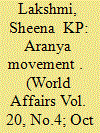

|
|
|
|
|
| Summary/Abstract |
Sheena Lakshmi KP describes the rural renewal movement led by Aranya Agricultural Alternatives for promoting ecological practices, organic farming, sustainable development and traditional healthcare in villages in India. These communities focus on preserving native farming practises and knowledge and women are at the forefront, leading by example.
|
|
|
|
|
|
|
|
|
|
|
|
|
|
|
|
| 10 |
ID:
087519
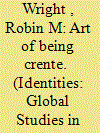

|
|
|
|
|
| Publication |
2009.
|
| Summary/Abstract |
The central objectives of this article are to describe and analyze the Baniwa Art Project, a sustainable development project based on intensive production and commercialization of basketwork, which the Baniwa Indians of the Northwest Amazon (population approximately 12,000), with the assessment of the SocioEnvironmental Institute (ISA), a major NGO in Brazil, launched in the late 1990s. The goals of this project were to enhance the value of the Baniwa basket-making tradition, increase production within the limits of the sustainable use of natural resources, generate income for indigenous producers and their political associations, and train indigenous leadership in the skills of business management. This very successful project was initiated shortly after the creation of the Indigenous Organization of the I ana River Basin (OIBI) and essentially involves 16 of the more than 100 Baniwa communities of the I ana River and its tributaries in Brazil. This article reflects on how young Baniwa evangelical political leaders, with the support of the NGO, promoted the rise of individualism, as well as the introduction of Western values of economic and political success. This generated conflicts with more "traditional" values and practices of egalitarianism producing an increase of witchcraft accusations. The case of a young Baniwa leader who coordinated both the political association and the Art Project illustrates extremely well the sorts of grave conflicts that emerged. This article will also reflect on modifications in human/spirit relations following the introduction of evangelicalism and sustainable development projects. For this, I shall cite extensively from a recent interview I conducted with a Baniwa political leader regarding his perceptions of the relations between evangelicalism, the political movement, and the meanings for the Indians of the notion of "sustainable development."
|
|
|
|
|
|
|
|
|
|
|
|
|
|
|
|
| 11 |
ID:
168667
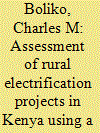

|
|
|
|
|
| Summary/Abstract |
This research is driven by the goal to develop human survivability studies, a solution oriented, trans-disciplinary academic approach for resolving multiple complex societal challenges. Given persisting poverty and inequality in rural areas of developing countries, as well as their vulnerability to the effects of climate change, there are high expectations that rural electrification using renewable energy can contribute to their sustainable development. We therefore use a sustainability framework to assess the contributions of four electrification projects in rural Kenya in ensuring the long-term well-being of local residents and future generations. Our results show that off-grid electrification projects run by the private sector were the better performers in the assessment. While more research is necessary to improve robustness, our preliminary policy recommendations are that Kenyan policy makers should provide further support to private sector-led off-grid solar electrification efforts.
|
|
|
|
|
|
|
|
|
|
|
|
|
|
|
|
| 12 |
ID:
149837


|
|
|
|
|
| Summary/Abstract |
Small islands face difficult challenges to guarantee energy, freshwater and food supply, and sustainable development. The urge to meet their needs, together with the mitigation and adaptation plans to address climate change, have led them to develop renewable energy systems, with a special interest in Ocean Thermal Energy Conversion (OTEC) in tropical islands. Deep Ocean Water (DOW) is a resource that can provide electricity (through OTEC in combination with warm surface water), low temperatures for refrigeration, and nutrients for food production. In this paper we propose an Ocean Technology Ecopark (OTEP) as an integral solution for small islands that consists of an OTEC plant, other alternative uses of DOW, and a Research and Development (R&D) center. We present an application of OTEP to San Andres, a Colombian island that meets all the necessary conditions for the implementation of OTEC technology, water desalinization, and a business model for DOW. We present the main entrance barriers and a four-stage roadmap for the consolidation and sustainability of the OTEP.
|
|
|
|
|
|
|
|
|
|
|
|
|
|
|
|
| 13 |
ID:
154128
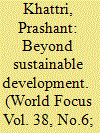

|
|
|
|
|
| Summary/Abstract |
The sustainable development framework came to the fore-front of the international policy making during the 1987 at the United Nations Commission on Environment and Development. This Commission which is popularly known as the Brundtland Commission established the need for sustainable development as against the dominant model of development that was not sensitive to the needs and conservation of the environment.
|
|
|
|
|
|
|
|
|
|
|
|
|
|
|
|
| 14 |
ID:
160969
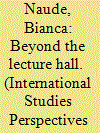

|
|
|
|
|
| Summary/Abstract |
As the global population is lifted out of poverty through intergovernmental and national efforts, the number of students enrolled in university degree programs has been steadily increasing. Although this is generally a good indicator for human development, it has resulted in oversaturated job markets where competition for employment is fierce and only the most capable university graduates are employed. Students from rural universities in the Global South face particular difficulties in this competition. This article draws on literature from educational psychology to propose practical teaching methods that simultaneously equip students with marketable, job specific skills, and foster within them feelings of empowerment. These prepared and empowered students are the cornerstones of sustainable development in rural communities.
|
|
|
|
|
|
|
|
|
|
|
|
|
|
|
|
| 15 |
ID:
181697
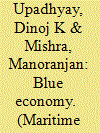

|
|
|
|
|
| Summary/Abstract |
Blue economy, which promotes sustainable usages of ocean resources for economic growth and development, as well as preservation of the health of ocean ecosystem, has become a crucial element of the broader ecosystem of sustainable and inclusive development. The desire to sustainably harness the potential of ocean and marine resources has been amply visible at the national and global level. Technological innovations, investment and multilateral cooperation have further been facilitating progress in the sectors of blue economy. Placed in a central position in the Indian Ocean and with a vast exclusive economic zone (EEZ), India has substantial potential for tapping marine resources and blue economy could emerge as the paradigm of development in the future. New Delhi has taken many initiatives to promote blue economy activities and development of modern infrastructure for greater connectivity, international collaboration and trade facilitation. Further, it is seeking wider multilateral cooperation in areas of financing, technology transfer, capacity building and knowledge sharing. This paper underlines the importance of blue economy in a broader framework of sustainable development and analyses India’s foreign policy orientation towards blue economy. Finally, it also discusses cooperation between India and European countries in the sectors of blue economy.
|
|
|
|
|
|
|
|
|
|
|
|
|
|
|
|
| 16 |
ID:
152774
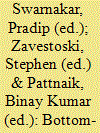

|
|
|
|
|
| Publication |
New Delhi, Sage Publications India Pvt Ltd, 2017.
|
| Description |
xv, 345p.: tables, figureshbk
|
| Standard Number |
9789386446046
|
|
|
|
|
|
|
|
|
|
|
|
Copies: C:1/I:0,R:0,Q:0
Circulation
| Accession# | | | | | | | | | | | |
| 059050 | 338.954/SWA 059050 | Main | On Shelf | General | | | | | | | |
|
|
|
|
| 17 |
ID:
131835
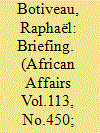

|
|
|
|
|
| Publication |
2014.
|
| Summary/Abstract |
MORE THAN A YEAR AFTER the South African police killed 34 strikers in Marikana, labour unrest continues across the country's mining sector. Industrial actions have targeted platinum giants like Amplats, the world's largest producer, where an 11-day strike over planned retrenchments has just ended and another is looming amid fresh wage talks. Rivalry between the National Union of Mineworkers (NUM) - aligned with the African National Congress (ANC) - and the more recent and militant Association of Mineworkers and Construction Union (AMCU) has also plagued the industry. On 17 October, an NUM branch chairperson at Lonmin - the third largest platinum producer in the world - was shot dead. Another Lonmin NUM shaft steward died in a similar situation on 3 November. A few months ago a former NUM leader who had become the AMCU regional representative in Rustenburg was ambushed - one of several from both sides assassinated since the Marikana massacre. In other words, the 'Framework Agreement for a Sustainable Mining Industry', promoted by South African Deputy President Kgalema Motlanthe and signed by parties to the industry on 3 July 2013, has so far failed to restore peace to the mining sector in Africa's largest economy.
|
|
|
|
|
|
|
|
|
|
|
|
|
|
|
|
| 18 |
ID:
162091
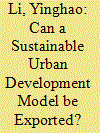

|
|
|
|
|
| Summary/Abstract |
In the search for more sustainable models for Chinese cities, the concept of “eco-city” has been advanced and widely discussed as capable of providing solutions for environmental, ecological, and socio-economic problems. This article questions the specificities of the concept against lessons drawn from the experiences of eco- and sustainable quarters being implemented in France and other places in Europe. The model for a Chinese eco-city is considered in the light of our study of the Tianjin eco-city, which is a Sino-Singaporean project half-way towards its intended completion in 2020. Our study was conducted on the spot within this eco-city, and it enables us to make a close examination of a number of its specific aspects and to raise questions, in a manner not yet fully researched in this area, as to how widely such an urban model might be diffused. Its implementation of a system of performance indicators, and its introduction of a structure of governance to support environmental protection, represent promising avenues for a paradigm change in Chinese urban planning. On the other hand, the bias in favour of technological solutions and the lack of concern with the residents’ life styles are a matter for debate over the pertinence and sustainability of such a model for urban development.
|
|
|
|
|
|
|
|
|
|
|
|
|
|
|
|
| 19 |
ID:
103458
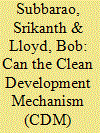

|
|
|
|
|
| Publication |
2011.
|
| Summary/Abstract |
The paper investigates whether the Clean Development Mechanism (CDM) under the Kyoto Protocol has played a significant role in the development of rural communities, specifically investigating uptake of small-scale renewable energy projects. The investigation involved an assessment of 500 registered small-scale CDM projects under the Kyoto Protocol in terms of their potential impact on the envisaged sustainable development goals for rural communities. Five case studies from the Indian subcontinent were also examined.
The paper concludes that the CDM in its current state and design has typically failed to deliver the promised benefits with regard to development objectives in rural areas. Successful projects were found to have had good community involvement and such projects were typically managed by cooperative ventures rather than money making corporations. The paper puts forward a new framework for the assessment of such benefits in the hope that future projects can be better assessed in this regard. The key problem, however, remains on how to deal with the inherent contradiction between development and sustainability.
|
|
|
|
|
|
|
|
|
|
|
|
|
|
|
|
| 20 |
ID:
082246
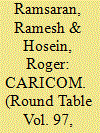

|
|
|
|
|
| Publication |
2008.
|
| Summary/Abstract |
The article examines economic performance in the CARICOM Region against the background of the challenges facing the growth of both regional and international trade. It argues that CARICOM has not only failed to create the expected dynamic in intra-regional trade but has also failed to lay the groundwork for a competitive and efficient manufacturing sector that could exploit foreign market opportunities in an increasingly transparent global economy. A strategy for greater competitiveness needs to embrace a broad range of non-price factors
|
|
|
|
|
|
|
|
|
|
|
|
|
|
|
|
|
|
|
|
|